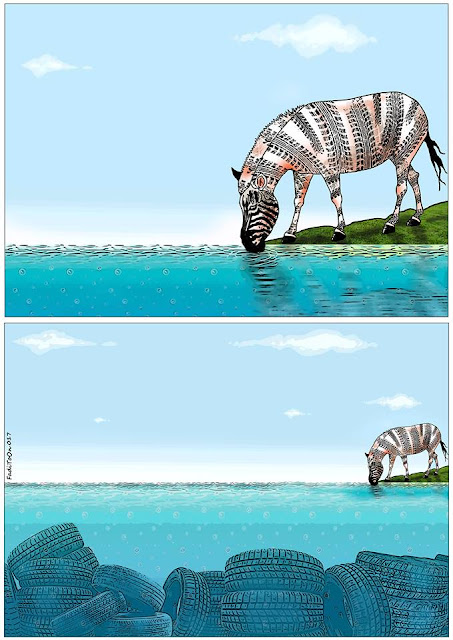De-portrayal
Cartooning is a way of saying no without ending up with aggression, as Bonil stated in an interview last week.
For that very reason it is absurd that humor is right now seen as an aggressor, he continued. Xavier Bonilla (Bonil) himself is being constantly threatened by the Ecuadorean president, Rafael Correa and Bonil is presently caught up in the second of two lawsuits, the first of which went against the cartoonist. As an example of the presidential "Imagine, me against humor?!"-style, the British comedian John Oliver had his own set to with him here and the response here.
Johan Oliver concluded that Correa need to learn to prioritize his time, not pursuing anyone mentioning his name and to weaken his hypersensitivity in the process. Such is the response from a free citizen in a democracy, while Bonil caught up in Correa's juridical restrictions of journalistic freedom deduced that politics and humor are married to one another. A marriage in the sense that citizens use humor as their act of resistance against the abuses of political power.
Correa is a typical specimen of a political leader wiping out all traces of bad press. Still, he as everyone else knows the importance of being seen. Let him not be seen at all then, was one stance in the case of Correa's colleague al-Assad at the onset of the Syrian revolution. Posters of Assad's face had till then been glued to every piece of wall available in Syria as an ingredient to boost his tyranny. Consequently, the iconography of the uprising ought to contain anything but him and keep its focus on the call from the Syrians to gain their dignity.
The bloodshed in Syria entered its fifth year last week with yet another poison gas attack this time chlorine used on civilians in Sarmin in the Idlib region. An all too fitting occasion to point him out, but this time as an un-being. Saad Hajo has drawn him in the negative in every sense of the word, marked on the paper by the absence of ink and placed upside down.
He is de-faced. An act of de-facing before our very eyes. Saad Hajo's drawing is an paragon of the fact that it is not an afterthought, but a participant in its day and age, and if we say that cartoons just as words create reflection, which in turn may lead to action, we can develop it further and state that cartooning is an act in itself. As such it is a democratic act seeing that it leads to further dialogue and arguments being made.
The drawing is not declaring to be a final word, although let us leave him de-portrayed.
 |
| Saad Hajo, February 11, 2015. From his Series Shame, this is No. 78. |
The cartoon shown is courtesy of Saad Hajo and must not be reproduced without his permission.

